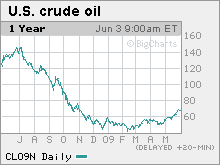Oil sinks after surprise supply jump
Prices decline further after government report shows 2.9-million-barrel rise in stockpiles.
NEW YORK (CNNMoney.com) -- Oil prices extended their decline Wednesday after a weekly government inventory report said crude supplies rose unexpectedly.
Light, sweet crude for July delivery fell $2.43 to settle at $66.12 a barrel Wednesday. Oil had traded down 75 cents just prior to the report's release.
In its weekly inventory report, the Energy Information Administration said crude stocks increased by 2.9 million barrels in the week ended May 29.
Analysts expected oil supply to decrease by 2 million barrels, according to a consensus estimate of industry analysts surveyed by Platts, a global energy information provider.
"As much as people want to say that the energy markets are ignoring the supply and demand data ... [it] may be critical as to whether or not oil continues its incredible strength or whether it takes a well-deserved rest and correction," wrote Phil Flynn, analyst at Alaron Trading, in a research note.
Oil prices had closed higher for six straight sessions until Tuesday, when the market finished down 3 cents.
"This market has been building up on a mountain of good feelings and expectations, and after this run it may need some more reassurance," he added.
But other data from the EIA report was also a drag on prices. Stockpiles of gasoline fell by 200,000 barrels, less than the 1.5 million barrels analysts predicted.
Distillates, which are used to make heating oil and diesel, increased by 1.6 million barrels. Analysts were looking for an increase of 950,000 barrels.
OPEC output rises: The Organization of Petroleum Exporting Countries -- whose members produce about 40% of the world's crude -- reported its supply rose in May due to higher output from members including Angola and Nigeria, according to Reuters.
Supply from the 11 OPEC member countries that are bound by output targets rose to 25.91 million barrels per day from a revised 25.62 million in April, Reuters reported.
Other markets: The currency market also pushed oil prices lower as the dollar rebounded against the euro. The price of oil often falls when the greenback rises, because crude is priced in dollars around the world.
The stock market also retreated from its own recent rally, placing downward pressure on crude prices. The oil market has tended to follow stocks recently, as crude investors look to the broader markets to try to gauge when fuel demand will rebound.
Gasoline prices: The national average price for a gallon of regular unleaded gasoline increased to $2.548 Wednesday, up 2.3 cents from the previous day's price of $2.525, according to motorist group AAA.
It was the 36th consecutive day of increases, during which time the average price of gas has increased 50 cents, or 24.4%. ![]()


